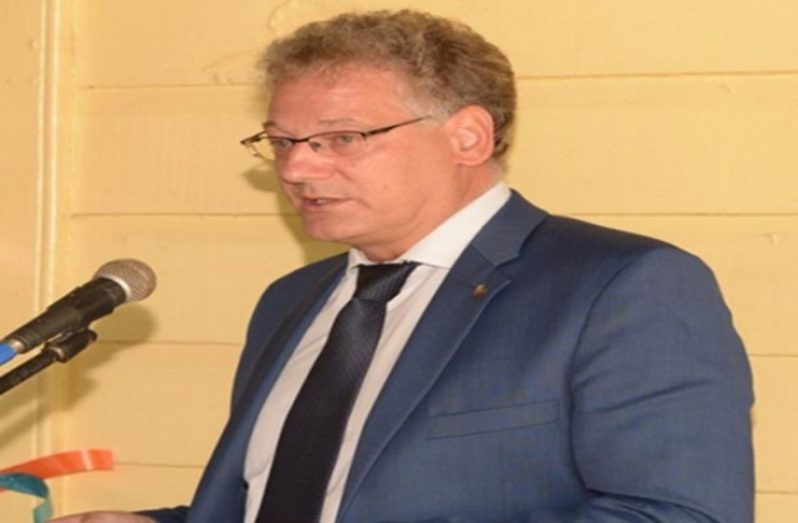THE European Union has been supporting transformation of the electricity and water sectors here with the injection of much-needed funds, the latest being a USD 40.4 Million grant through the Caribbean Investment Facility to address priority needs of the sectors.
In a release, the EU said in October 2014, it teamed up with the Inter-American Development Bank (IDB) and committed to support the efforts of the Government of Guyana to improve the quality and delivery of reliable water supply; and also to strengthen the reliability and efficiency of electricity service delivery. In this regard, representatives of both organisations had met at IDB headquarters in Washington DC on October 10, 2014, to sign the loan and investment grant agreement with the Cooperative Republic of Guyana. According to the release, at the time and in the framework of the agreement, the EU had contributed to the partnership with USD 7.49 Million towards the Power Utility Upgrade Programme (PUUP), and USD 6.3 Million towards the Water Supply and Sanitation Infrastructure Improvement Programme (WSSIIP). These funds were disbursed to the IDB to act as the contracting authority for works under the PUUP and WSSIIP. In September 2018, additional payments from the EU’s contribution totalling USD 17.3 Million, were disbursed to the IDB towards the Power Utility Upgrade Programme (PUUP), and Water Supply and Sanitation Infrastructure Improvement Programme (WSSIIP).
In recognising the delivery of the EU grant disbursement, EU Ambassador to Guyana, Jernej Videtic highlighted that both the EU and the IDB recognised the need to assist Guyana’s further development through investments in the energy and water sectors and therefore allocated USD 40.4 Million through the Caribbean Investment Facility to address the priority needs of the sectors. Videtic stressed that in the energy sector, work will focus on strengthening the management capacity of the Guyana Power and Light (GPL); increasing operational efficiency and reducing commercial and technical losses. This will necessitate the rehabilitation of distribution lines network in Georgetown and Region IV and will benefit the population living in the coastland Regions IV and V.
He further added that in the water sector, work on strengthening the performance of the Guyana Water Incorporated, improving water pressure, quality and continuity of supply as well as reducing non-revenue water losses will be undertaken.
The EU Ambassador highlighted that an important aspect will be an improved access to sanitation for low-income households; the construction of three new water treatment plants at Diamond on the East Bank of Demerara, Sheet Anchor in Berbice and Uitvlugt on the West Coast of Demerara, coupled with major rehabilitation works of the water treatment plant at Shelterbelt, Georgetown is also part of the project. At least 55,300 households will benefit from upgraded access to drinking water.
The European Union approved the creation of the Caribbean Investment Facility (CIF) on April 30, 2012. The purpose of the CIF is to strengthen Caribbean regional integration and to foster investments in key infrastructure in the Caribbean, with a particular focus on the energy, environment, climate change mitigation and adaptation, transport and social infrastructure sectors. These projects are the first to be funded under the CIF programme.
The collaboration is part of the EU’s Innovative Financial Instruments commonly called ‘blending,’ which is an instrument for achieving the EU’s external policy objectives, complementary to other aid modalities and pursuing the relevant regional, national and overarching policy priorities. The principle of the mechanism is to combine EU grants with loans or equity from public and private financiers. In parallel, several thematic initiatives are supported through blending, with special focus on inclusive and sustainable private sector development. The Electrification Financing Initiative (ElectriFI) aims at accelerating access to electricity and modern energy services through intervention at the development stage of a project, Agriculture Financing Initiative (AgriFI)’s objective is to unlock, accelerate and leverage investments with a value-chain approach, focusing on smallholder’s inclusiveness and/or MSME agri-business and Climate Finance Initiative supports identification and piloting of innovative climate finance instruments to mobilise private development finance.





.jpg)








